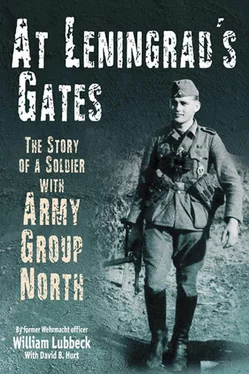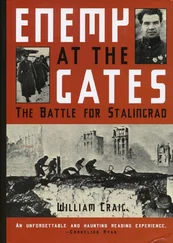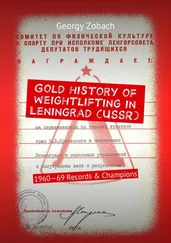Following the commencement of Operation Barbarosa that summer, Lubbeck was assigned to serve as forward observer for his company’s howitzers. After penetrating into the suburbs of Leningrad, his unit was soon pulled back to the outskirts of the city. There it joined other German forces initiating a siege of Leningrad on Hitler’s orders at the start of a brutal winter.
As Soviet forces steadily grew in strength and capability over the next two years, Lubbeck fought in a series of increasingly desperate battles at the Volkhov River, along the corridor to the Demyansk pocket, at Novgorod, and near Lake Ladoga.
Soon after receiving the Iron Cross First Class, in late 1943 Lubbeck entered an officer training program in Germany. Following his return to the front in the late spring of 1944, he took command of his old company as it battled through a harrowing year-long retreat back through the Baltic region and into East Prussia.
Upon his release from a POW camp after the war, Lubbeck struggled to survive in Germany’s calamitous post-war economic conditions. With little food to eat, he and his new wife were ultimately forced to risk crossing the Iron Curtain in order to reach his family’s farm in the Soviet Zone. After six difficult years, they finally made the decision to leave Germany.
Emigrating from their homeland with almost nothing, he and his family spent the next decades building a new life, first in Canada and then the United States. His triumph over adversity and integration into a new society as an American immigrant is an extraordinary tale in itself, and provides him with a unique perspective from which to relate his experiences as a German soldier.
Every effort has been made to recount the events in this memoir accurately in the hope that it can contribute to the historical record. Beyond adding significant new insights into the experiences of German soldiers in the frontlines of the Second World War, William Lubbeck’s account reveals how a man’s character, deep sense of discipline, and love for a woman and his family shaped the course of his life and allowed him to survive and prosper in the face of great adversity during and after the war.
It is a privilege to share his compelling story with a wider audience.
DAVID HURT
July 2006

EAST AND WEST PRUSSIA IN EARLY APRIL 1945
Heavy lines indicate the front encircling the remaining German-held territory between the Samland and the Hela Peninsula.
LAST ORDERS: APRIL 16–18, 1945
It was the end.
It was the end for my company.
It was the end for the 58th Infantry Division.
It was perhaps the end for Germany and for me.
In the four years since the invasion of Russia, April 16, 1945 was for me the worst day of the war. In the past hours, the heavy weapons company under my command had simply ceased to exist.
The disaster at the key road junction of Fischhausen was not a battle, but rather the catastrophic climax to the unrelenting Soviet barrage that had pursued our retreat westward during the previous weeks. Finally, trapped in a congested mass with other German units trying to move down the single main road through this East Prussian town, there was no longer any way to move forward.
Concentrating on this chokepoint, the artillery of four Soviet armies combined with several hundred aircraft to let loose a devastating assault. Everyone who failed to escape into one of the side streets was annihilated in a cataclysm of Russian rockets, shells, and bombs. A strafing run by a Soviet fighter plane on the western outskirts of Fischhausen left my face perforated with small bullet fragments and my eyes almost blinded by dirt and blood, but I realized that I had been fortunate simply to survive the onslaught.
Of the roughly 100 remaining troops from my company who had entered Fischhausen, it was clear that most had been killed in the attack. The death of so many of my men was emotionally wrenching, even if the loss of soldiers had become tragically commonplace during the course of the war.
What was most shocking to me was the ongoing collapse of military order that had begun even before we reached Fischhausen. Until this point, even as the military circumstances had grown more calamitous, the Wehrmacht (German armed forces) had successfully maintained its discipline and unit cohesion. Now, everything was in utter disarray.
In our catastrophic condition, it seemed impossible that only three and a half years earlier these same Russians had appeared to be on the verge of collapse as we stood at the gates of Leningrad. Yet in the years that followed I had seen the tide of war steadily turn as the Soviets recovered and joined with the Western Allies, to force Germany onto the strategic defensive.
When I returned to the Eastern Front from officer training in May of 1944, the Wehrmacht had already retreated from most of the conquered Soviet territory. Army Group North, one of the three large German Army groups in the East, had pulled back from Leningrad into Estonia. Weeks later, Army Group Center to the south of us was nearly destroyed by a gigantic Soviet attack. In the months that followed, we withdrew ever further west back into the territory of the German Reich.
Since late January of 1945, I had led the steadily thinning ranks of my heavy weapons company in continuous combat against the inexorable torrent of Soviet forces pushing into East Prussia. Overwhelmed by the Red Army’s enormous advantage in men and equipment, it was clear that our situation was worsening by the day. Nonetheless, we battled on. What choice did we have? Faced with enemy troops to our front and the Baltic Sea to our rear, there was little hope of ever getting back to central Germany. Like cornered animals, we were simply fighting for our lives.
Promoted from first lieutenant (Oberleutnant) to captain (Hauptmann) in late March, I struggled to maintain discipline and morale among the troops under my command. The men in my company attempted to retain their usual confident spirit, but there was little secret what the future held for us. In these circumstances, falling to a Russian bullet on the battlefield seemed far better than the hellish conditions that faced a German POW in the Soviet Union.
As an officer, I felt a special dread of capture by the Red Army. If not killed in combat, I expected to be confronted with a choice between surrender and suicide. I planned to save one last bullet for myself, though it was uncertain whether I would be able to summon the courage to use it. Just two months short of my twenty-fifth birthday, I did not wish to die. So far, I had succeeded in escaping death and eluding this terrible dilemma.
With Fischhausen now reduced to smoking rubble and the Red Army only a couple of miles away, I wandered west from town along with other surviving German troops heading along the main road into the pinewoods.
At the limits of physical fatigue and psychological stress, my body moved forward almost robotically. My mind was numb, but I still felt a deep responsibility to my men. My purpose now was to locate any others who might have evaded the slaughter and taken refuge in one of the abandoned homes or many empty ammunition bunkers that filled the forest.
Sand and blood from the earlier attack still clouding my vision, I stumbled along beside the road, barely able to see where I was going or what was around me. Every twenty yards or so, the whistle of another incoming artillery shell forced me to throw myself against the ground. Getting back to my feet, I staggered forward again, constantly trying to blink my eyes clear in order to be able to identify the next position where I might seek cover.
Читать дальше













